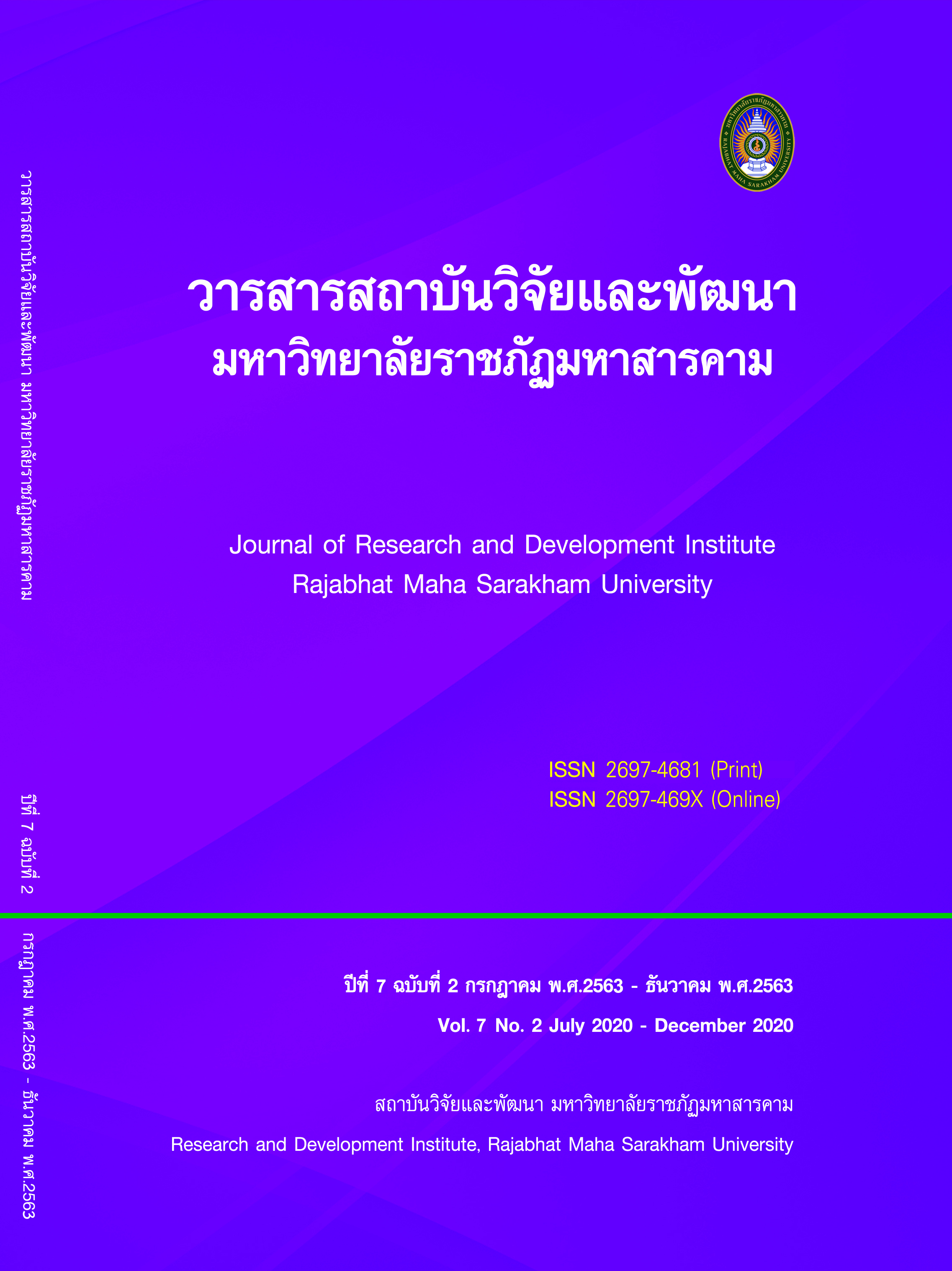Development to Learning Analytical Thinking and Achievement in Geography of Students in Matthayomsuksa 2 by Using Problems-Based Learning Activities
Keywords:
Analytical thinking, Learning achievement, Problem-Based Learning activitiesAbstract
The purposes of this research include (1) to develop analytical thinking skills and achievement in Geography of Mattayomsuksa 2 students by using Problem-Based Learning activities on the 75/75 efficiency criterion. (2) to find the effectiveness index of Problem-Based Learning activities. (3) to compare the results of analytical thinking skills and achievement in Geography to the criteria of 75 percent. And (4) to study the contentment of Problem-Based Learning activities. The sample group was grade 2 of 42 primary school students from Mahasarakham University Demonstration School, Faculty of Education, Mahasarakham University, during the second semester of the 2019 academic year. The instruments which were used in the study consisted of lesson plans, analytical thinking skills test, learning achievement test and satisfaction questionnaire. Statistics employed for analysis of data included mean, percentage, standard deviation, and t-test (One sample).
The results of the study were as follows (1) The use of Problem-Based Learning activities that the effectiveness index reached the efficiency at 84.46/77.76 which met the established criterion of 75/75. (2) The effectiveness index of the use of Problem-Based Learning activities is reached 0.5066 or the percentage of 50.66. (3) The result after using the developing analytical thinking skills and achievement in Geography of Mattayomsuksa 2 students by using Problem-Based Learning activities showed that the scores were significantly higher than 75 percent at 0.05 level. And 4) the contentment of Problem-Based Learning activities was in high level at 4.24
References
References
Bussarakum Boonklang. (2014). The Comparison of Learning Achievement, Analytical Thinking, and Attitudes toward Science Learning of Matthayomsuksa 5 Students between the Organizations of 7E Learning Cycle and Organization of Problem-based Learning Activities. Mahasarakham University.
Caroline. (2011). Problem-Based Learning in Secondary Science, Australia’s Authority on Science.
Jiranoot Thinkamchoet. (2014). A Development of Learning Activities by Using Problem Based Learning on Life and Environment by Action Research for Mathayom Sueksa 3 Students. Rajabhat Maha Sarakham University.
Khajornsak Jathaisong. (2018). A study Mathematics achievement by using problem-based learning. For Grade 7 students. [Online]. https://edu.kpru.ac.th/math/?page_id=187.
Kittiya Chongrak. (2016). The Development of Learning Activity by Using Problem-Based Learning with Online Social Media to Enhance Analytical Thinking and Learning Achievement for Mathayomsuksa 4 Students. Mahasarakham University.
Nantana Thanwiset. (2018). “A Study of Learning Achievement on Work and Energy Learning Unit and Problem Solving Ability for Grade 10 Students Using Problem Based Learning (PBL)”. Academic Services Journal, Prince of Songkla University, 29 (2): 43-50.
Nittaya Pusumpao. (2014). Comparisons of Learning Achievement on Mathematics entitled “The Inequality” for Matthayomsueksa 4: Analytical Thinking Abilities and Attitudes toward Learning Mathematics between the Organizations of KWDL and PBL Learning Activities. Mahasarakham University.
Panadda Piyawarakorn. (2016). The development of mathematic study activity about limit and function continuous in high school education level 6 by type using resolving that affect the result of learning the idea, analyze and attitude of mathematic learning. Mahasarakham University.
Prasart Nuangchalerm. (2015). 21st Century Learning in Science. Bangkok: Chulalongkorn University Press.
Sarinya Prayalor. (2014). Development of Learning Achievement and Ability of Analytical Thinking in the Subject of Safty Life of Grade IX Students by Using Problem-Based Learning (PBL). Master of Education Thesis in Curriculum and Instruction, Graduate School, Khon Kaen University.
Sirintthra Mintakat. (2013). The Effect of Problem-Based Learning Instruction Activities in Surface Area and Volume on Analytical Thinking and Mathematical Reasoning of Mathayomsuksa III Students. Master Thesis, M.Ed. (Secondary Education). Bangkok: Graduate School, Srinakharinwirot University.
Thapanee Thaisopa. (2016). Comparisons of Learning Achievement, Basic Science Process Skills, and Scientific Attitudes, Of Pratomsuksa Six Students between Organization of Inquiry 7E Learning Activities and Organization of Problem Based Learning Activities. Mahasarakham University.
Tisana Khammani. (2013). Science of Teaching: knowledge for effective learning process management. 17th edition, Bangkok: Chulalongkorn University.
Yupaporn Hanyiam. (2013). The Development of Analytical Thinking and Achievement of Geography by Problem-Base Learning of Mattayomsuksa 4 Students at Phukdeechumphon Wittaya School Chaiyaphum. Master of Education Thesis in Curriculum and Instruction, Graduate School, Khon Kaen University.
Downloads
Published
How to Cite
Issue
Section
License
Articles that are published are copyrighted by the authors of the articles







